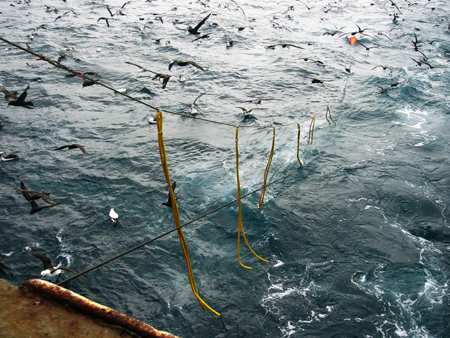BirdLife South Africa invited partners to Global Seabird Bycatch Assessment Workshop
For first-ever estimate of seabird bycatch from tuna longline fisheries in the Southern Hemisphere
28 February 2019
24 February-1 march 2019 | Skukuza, South Africa. This week, the Common Oceans ABNJ Tuna Project's partner BirdLife South Africa convened a workshop of experts from major fishing nations and international organizations to attempt the first-ever estimate of seabird bycatch from tuna longline fishing operations in the Southern Hemisphere. A culmination of efforts since 2016 to compile data from all fisheries operating south of 25oS, an area which is home to some of the world's most endangered albatrosses and petrels.
 |
| Tori line cables ©Bronwyn Maree/BirdLife South Africa |
Bycatch is widely acknowledged to be the single greatest threat to the majority of these species, but data quality and data confidentiality issues have until now blocked efforts to quantify the number of seabirds killed through fishery interactions. The workshop format overcame data confidentially concerns by providing a forum for joint analysis by national data holders. It further overcame data quality issues by using methodologies developed over the past three years that are designed to draw from a variety of datasets in order to avoid what would otherwise be significant information gaps.
In addition to producing and communicating a comprehensive Southern Hemisphere seabird mortality estimate for the first time, the Birdlife South Africa-led initiative will aim to strengthen capacity for future seabird monitoring and assessment activities. Results from the workshop are expected to recommend data improvement initiatives to help accelerate and monitor the implementation of best practice seabird mitigation measures within the tuna Regional Fisheries Management Organizations (RFMOs).
The Common Oceans ABNJ Tuna Project, funded by the Global Environment Facility and implemented by FAO, harnesses the efforts of a large and diverse array of partners, including the five tuna RFMOs, governments, inter-governmental organizations, non-governmental organizations and private sector, to achieve responsible, efficient and sustainable tuna production and biodiversity conservation in the areas beyond national jurisdiction.
For more information, please contact:
- Ms Nini van der Merwe, International Liaison and Communications Coordinator, BirdLife South Africa | [email protected]
- Mr Alejandro Anganuzzi, Global Coordinator, Common Oceans ABNJ Tuna Project | [email protected]
 |
 |
 |
